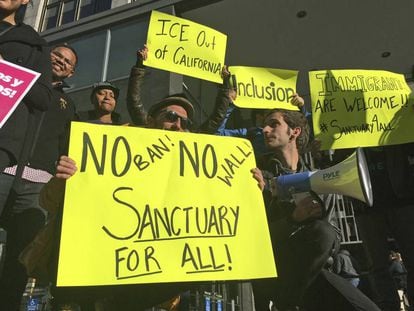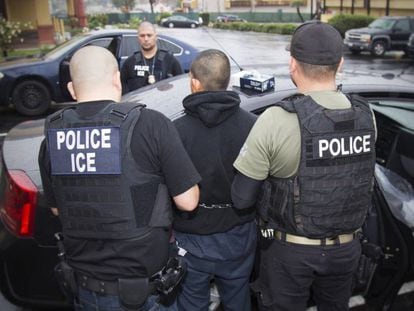Latinos march in California to protest Trump’s immigration policies
Los Angeles and San Francisco brought to a standstill as immigrants highlight their role in the economy
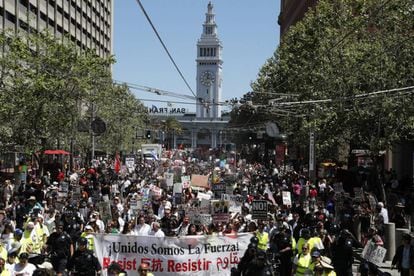
California, the US state with the largest immigrant community and whose Democrat-run leadership has openly challenged President Donald Trump’s immigration policies, saw a day of protest on Monday, with stores, restaurants and many other businesses closed in Los Angeles and San Francisco, as people took to the streets on May Day to highlight the role played by immigrants in the US economy.
In San Francisco, thousands of Latinos gathered on and around the city’s main Market Street, blocking it to traffic. Immigrant associations had been preparing the event for months, determined to stage a powerful show of opposition to Trump. They were joined by left-wing groups, civic associations and members of the public keen to show their support.
Yadira Sánchez, aged 27, arrived in the United States when she was four. She now campaigns with others of her generation against Trump’s order to detain and deport immigrants without residency papers.
A small group of Trump supporters, protected by the police, were jeered
“We are sending a message to say stop the deportations. This country imposes policies on the whole world, beyond its borders, that are the cause of migratory movement,” she explained.
At 11am, protesters gathered in Justin Herman Plaza, waving banners and flags. Municipal offices in nearby areas shut down for the day in solidarity.
The march began at 11.30am, accompanied by musicians and dancers, along with families with toddlers and wheeling baby buggies.
Aniela Valtierra, originally from the Texan border city of El Paso, is the spokeswoman for La Cocina, a well-known startup that trains immigrant women how to cook and run a restaurant. She was accompanied by around 20 female colleagues: “The majority of us are latinas, but there are also colleagues from India. We are more united than ever, particularly those from Mexico and Venezuela,” she said.
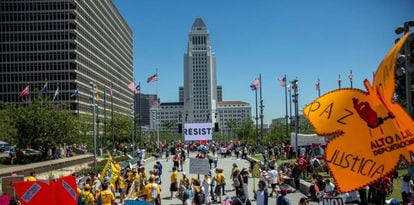
Over the course of the three-hour march, which went by without incident, demonstrators passed the offices of Twitter. Mobile networks were unable to meet demand in much of the city, which prevented many in the march from sharing with the world that Latinos had been able to bring the global technology capital to a halt.
In Los Angeles, thousands of people joined two marches that set off from MacArthur park to City Hall. Protesters filled several kilometers of Wilshire Boulevard. When they reached City Hall, they were met with banners reading: “Resist”.
Mayor Eric Garcetti highlighted California’s commitment to defending its immigrant population from the polices coming out of the White House.
“As long as I am mayor, the LAPD will never be a deportation force,” he said. “They will be your police officers,” he told the majority Latino crowd.
The march was organized by a coalition of more than 100 organizations, ranging from labor unions and religious organizations, to African American groups.
Along the route, a small group of Trump supporters, many of them with their faces covered and wearing crash helmets, was protected by a police cordon. They were insulted by many of the marchers passing by.
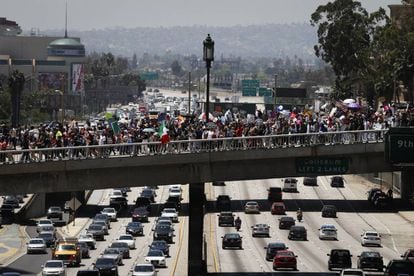
Among the protesters were Nicholas Jenkins, a white 18-year-old from Santa Monica, who said he had skipped class to continue “the enthusiasm and ideas of hopeful Bernie Sanders,” who lost the Democratic Party presidential nomination to Hillary Clinton. Also taking part was Alejandra Serrano, aged 41, an undocumented Mexican mother of five who has been living in Los Angeles for 21 years. She said she had taken a day off work to attend.
Serrano is one of the millions of migrants whose lives have been changed by Donald Trump. “We don’t laugh like we used to, we don’t sleep well. We’re not happy or secure like we felt a year ago,” she explained. After two decades in the city, she says she is now making contingency plans for her children in case she is arrested and deported. “I tell my 18-year-old daughter that she will have to look after her brothers and sisters. The four-year-old will come with me. Then the others will cry. I’m here to support all the Latinos and all the immigrants from every country,” she said.
English version by Nick Lyne.
